
Have you ever found yourself sniffling and sneezing with watery eyes as the flowers begin to bloom and the trees regain their leaves? If so, you’re likely one of the many experiencing the seasonal affliction known as hay fever.
Hay fever (also known as seasonal allergies or allergic rhinitis) affects over a quarter of all adults and a fifth of children in the United States.
If you’re one of these unlucky seasonal allergy sufferers, you may feel like there is little you can do to stop the constant runny nose and swollen sinuses. Think again – natural remedies like Chinese herbal medicine for hay fever can help you address your symptoms naturally and even prevent future hay fever attacks!
Read on to learn how to treat your hay fever with a holistic approach, and the best Chinese herbs to find relief.
What is Hay Fever?
Despite what its name might suggest, hay fever has little to do with actual hay. Instead, it’s an allergic reaction to outdoor or indoor allergens such as pollen, dust mites, or tiny flecks of skin and saliva shed by cats, dogs, and other animals with fur or feathers.
Spring is often the most troublesome season for hay fever sufferers. This is when the pollen count is at its highest, thanks to all the newly blooming trees, grasses, and flowers. The warm, windy days of spring also carry this pollen through the air. This is why being outside – even if you’re not near trees or flowers – can trigger symptoms if you are sensitive to these allergens.
Hay Fever Symptoms
The symptoms of hay fever can often be mistaken for a common cold. But, knowing which issue you’re dealing with is key to getting the right natural treatment.
While colds might include body aches and fever, hay fever sets itself apart with its hallmark symptoms. These include:
- Sneezing
- Runny or stuffy nose
- Itchy eyes, throat, or ears
- Frequent headaches
- Sinus pressure
For many, these symptoms are more than just a minor inconvenience; they can significantly impact your quality of life, disrupt sleep, weaken your immunity, and keep you from enjoying the great outdoors in spring.
What Causes Hay Fever?
Hay fever is typically caused by pollen, dust, or other tiny particles. In spring, the most common culprits are tree and grass pollen, while ragweed pollen may trigger you in autumn. But if we’re all exposed to these allergens, why do some people get hay fever and others don’t?
It all boils down to your immune system’s response to these harmless airborne substances. For those with hay fever, the body mistakenly identifies these allergens as harmful and releases histamine and other chemicals into the bloodstream to eliminate them. But since these allergens aren’t really harmful (like bacteria or viruses may be), there isn’t really a fight. Instead, this immune overreaction leads to excess mucus production, swelling, inflammation, and all those tell-tale hay fever symptoms.
Whether you get hay fever or not also depends on your state of health. Is your immune system already run down due to chronic stress? Do you smoke or live in a high-pollution city, and therefore already have an inflamed respiratory tract? Do you struggle with other types of allergies, like food sensitivities or autoimmune disease? These factors can make your body more susceptible to issues like seasonal allergies.
Western Treatment of Hay Fever
If you’ve struggled with allergies, you’ve probably tried a variety of different treatments to stop your symptoms.
In Western medicine, the common approach to managing hay fever involves a range of over-the-counter and prescription medications. Antihistamines are common, which work to reduce or block the symptom-causing histamines in your body and stop the allergic reaction.
Other OTC products like decongestants, corticosteroids, and other treatments may help reduce your symptoms for a short while. Unfortunately, these treatments often come with side effects and don’t stop allergies from coming back the next day.
What is Hay Fever in Traditional Chinese Medicine?
Traditional Chinese Medicine (TCM) views hay fever as a respiratory issue, just like Western medicine. But in TCM, hay fever is not just seen as an isolated reaction to allergens but as a symptom of a deeper imbalance within the body’s entire energetic system.
According to TCM, hay fever is often linked to a deficiency in the body’s defensive Qi (basically the energy of the immune system) and an imbalance of the organ systems, primarily the Lungs, Spleen, and Kidney. These deficiencies and imbalances make the body more susceptible to external pathogens like wind and cold, which lead to what we call “hay fever” or “allergies” in the West.
Types of Hay Fever in TCM
Hay fever is not a diagnosis in TCM, but rather a symptom. The true root cause is a pattern of imbalance that leads to the symptoms commonly experienced with hay fever. Here are a few of the most common patterns of disharmony:
- Lung Qi Deficiency
Lung Qi Deficiency means the Lung system doesn’t have enough power to operate well. It is characterized by a weak immune system and a susceptibility to allergies. Symptoms may include frequent colds, a pale complexion, and a feeling of being constantly tired. - Spleen Qi Deficiency
The Spleen in TCM is vital for processing food and turning it into energy. A deficiency can lead to dampness and phlegm, which block the lungs and contribute to many of the nasal symptoms of hay fever. Those with Spleen Qi Deficiency-type hay fever may also feel lethargic, struggle to lose weight, and have a sluggish digestive system. - Kidney Deficiency
According to TCM, the kidney is responsible for storing the body’s energy reserves. Over time or during chronic illness, the Kidney system can become depleted and affect the entire body. This deficiency typically leads to a weakened immune system, which can exacerbate hay fever symptoms. If a weak Kidney system is at the root of your hay fever, you may also have a weak lower back and knees, hormone imbalances, anxiety, fatigue, or urinary issues.
Best Chinese Herbs for Hay Fever
Tired of living with hay fever symptoms? Chinese herbal medicines can help. There is no single remedy for hay fever or seasonal allergies in TCM, but rather a range of possible formulas to address specific symptoms as well as the root cause or pattern of imbalance.
For Cold-Type Hay Fever: Xiao Qing Long Wan – by Lao Wei
Cold-type hay fever presents with symptoms like thin, watery mucus, body aches, and chills – and calls for a formula like Xiao Qing Long Tang (Minor Blue Dragon Decoction). This traditional formula is specifically designed to address what TCM identifies as a “Wind-Cold” pattern, often associated with cold-type hay fever. Xiao Qing Long Tang works by expelling the cold and dampness from the body, while simultaneously supporting the Lung Qi. This helps in alleviating the congestion and runny nose, and the warming properties of the herbs in the formula can counteract the chills and body aches.
For Hot-Type Hay Fever: Plum Flower – Upper Chamber Teapills (Cang Er Zi Wan)
If you get thick, yellowish nasal discharge, sinus congestion, and sometimes headaches in the spring, you may have heat or inflammation-type hay fever. Cang Er Zi Wan can help as it works synergistically to expel pathogenic wind, clear heat, and open the nasal passages. It is particularly effective in alleviating nasal congestion and sinus discomfort, which are prominent in hot-type hay fever.
For Chronic Hay Fever: Plum Flower – Magnolia Flower Teapills – Xin Yi Wan
Xin Yi Tang is particularly beneficial for those struggling with chronic hay fever and rhinitis, especially with cold signs like blocked nose with clear mucus, chills, and low energy. The magnolia flower is renowned in Traditional Chinese Medicine for its potent ability to dispel wind-cold and dry dampness, which are often the underlying causes in this allergy presentation.This is especially helpful for conditions that linger after colds or are exacerbated during allergy season.
-
Sale!
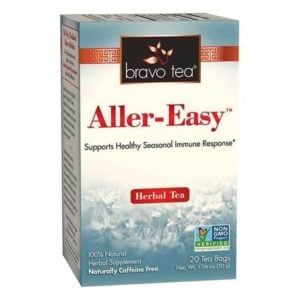 Aller-Easy Tea – by Bravo Tea
Starting at $6.99
Add to CartSelect options
This product has multiple variants. The options may be chosen on the product page
Aller-Easy Tea – by Bravo Tea
Starting at $6.99
Add to CartSelect options
This product has multiple variants. The options may be chosen on the product page
For Gentle Symptom Relief: Aller-Easy Tea – Bravo Teas
Aller-Easy Tea is a refreshing way to support a healthy immune response – a critical self-care step during high-allergy seasons. By bolstering the immune system, Aller-Easy Tea helps the body more effectively handle common allergens to keep the full brunt of hay fever symptoms at bay. If you are already experiencing mild allergy symptoms, drinking Aller-Easy Tea daily can offer gentle symptomatic relief for the typical symptoms of hay fever, such as sneezing, nasal congestion, and itchy eyes.
For Chronic Allergies and Weakness: Plum Flower – Six Gentlemen Teapills – Liu Jun Zi Wan
For chronic allergies that occur every spring (or last long after the pollen settles), there is usually Qi deficiency at the root. This hampers the immune system’s ability to combat these issues. Six Gentlemen Teapills is a traditional formula made of tonifying herbs specifically geared towards rebuilding and strengthening the body’s defenses, thereby restoring the Qi and stopping the allergies.
-
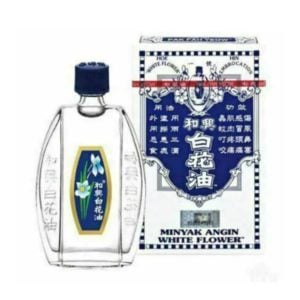 White Flower Oil (Embrocation) – by Hoe Hin Pak Fah Yeow
Starting at $12.49
Add to CartSelect options
This product has multiple variants. The options may be chosen on the product page
White Flower Oil (Embrocation) – by Hoe Hin Pak Fah Yeow
Starting at $12.49
Add to CartSelect options
This product has multiple variants. The options may be chosen on the product page
For Quick Congestion and Sinus Pain Relief: White Flower Oil (Embrocation) – by Hoe Hin Pak Fah Yeow
This oil is a blend of aromatic botanicals, including eucalyptus, lavender, peppermint, camphor, menthol, and wintergreen. These components work together to powerfully break through sinus and nasal congestion while promoting a sense of relaxation. Apply a few drops near the nostrils, temples, or behind the ear for quick relief from sinus congestion and pain.
Welcome Spring Without the Symptoms
Whether you’re allergy-prone or simply don’t want the inconvenience of a runny nose this spring, Chinese herbs can help you feel your best. From herbal formulas that naturally fight symptoms to remedies that rebalance and rebuild your immunity, there is something for any hay fever fighter out there. Need help managing other common respiratory issues, like cough, asthma, or bronchitis? Find these products and many others in our collection of Chinese herbs for allergies, sinuses, and respiratory health!


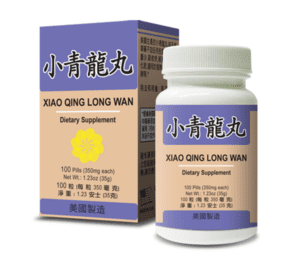 Xiao Qing Long Wan – by Lao Wei
Xiao Qing Long Wan – by Lao Wei
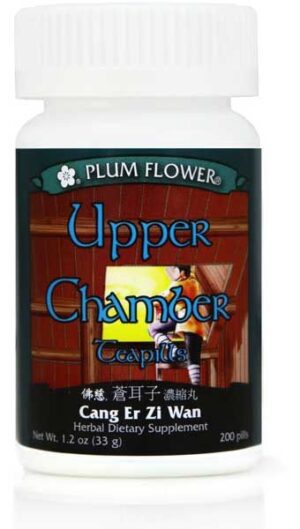 Plum Flower – Upper Chamber Teapills (Cang Er Zi Wan)
Plum Flower – Upper Chamber Teapills (Cang Er Zi Wan)
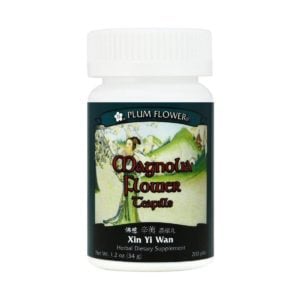 Plum Flower – Magnolia Flower Teapills (Xin Yi Wan)
Plum Flower – Magnolia Flower Teapills (Xin Yi Wan)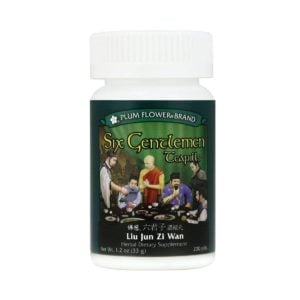 Plum Flower – Six Gentlemen Teapills (Liu Jun Zi Wan)
Plum Flower – Six Gentlemen Teapills (Liu Jun Zi Wan)